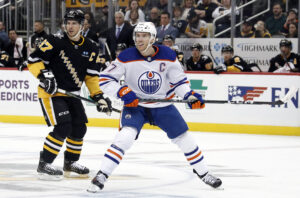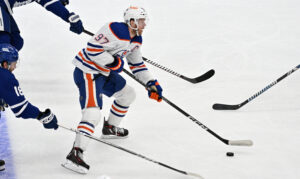There are loads of reasons why it’s not possible to fix the Vancouver Canucks. But let’s give it a shot anyway.
How to – Realistically – Fix the Vancouver Canucks
No fantasy moves allowed, here. A team isn’t going to swoop in and take bad contracts off the Canucks hands because they’re feeling generous. It’s not all going to happen in one season, either. The problems inherited over the past decade won’t take that long to correct, but it won’t be easy, either. First, the team and their fans need to put the playoffs down and step back. Step away from the 2022-23 NHL playoffs for their own good. Don’t even consider them as a possibility, then we can get to work.
Some moves can happen immediately – this season – but others need patience. It’s easy to say “burn it down” and throw matches, harder to plan and execute a firebreak. The objective shouldn’t be about appeasing the noisier fans, though that would be a happy side effect. As seen with the Montréal Canadiens, fans are okay with a relatively bad team so long as it looks like there’s a future. Yes, obviously an entry draft lottery win helps with the patience, but Canucks fans know better than that. Vancouver does not get first-overall draft picks of their own. They must trade for them, sign them as free agents, or occasionally get them off waivers.
Going over the ground rules, then. First, no miracle trades coming out of nowhere to save the Canucks cap crunch. Second, no winning the draft lottery, which is going to be hard on a team that simply isn’t bad enough to hit the bottom five. Third, no pretending the issue is with their current coaching staff. They tried that – uselessly – last year. And finally, these need to be moves that the owner is likely to approve, or at least not get in the way, of.
Do It Soon
Things that can be done this year are pretty basic. A lot of it is going to involve waiting for the season to end, alas. Apologies to the current season-ticket holders, but if we’re going to fix the Vancouver Canucks it’s not going to take weeks. In this case “soon” means between now and the end of the season, though realistically that means the trade deadline.
About Rutherford
Plenty of fans and media folks like hearing Jim Rutherford speak. He’s frank, he’s widely available, and he’s been around a while. Rutherford isn’t the team’s general manager, though he’s clearly carrying around a chunk of veto power. Actual GM Patrik Allvin certainly talks to Rutherford before deals get made. This isn’t a bad thing at all, taking advantage of Rutherford’s experience while retaining the having actual control.
But perhaps Rutherford could shut up for a bit? Or at least not go on the radio and talk about how much he wishes he could trade away all the players and fire the coaches. This is already a nervous team, as we discussed earlier. That nervousness translates onto the ice – this team is playing not to lose instead of playing to win. They’re not playing for their jobs, either. They already have their jobs, what they’d like to do is be secure in them. That isn’t going to happen when the boss is sharpening his axe in the break room.
Don’t Carry J.T. Horvat
Technically, the Canucks have the room to sign both J.T. Miller and Bo Horvat. Yes, even with the unsustainable goal production from Horvat, he and the team can find a deal. What they can’t do is afford it if they want to improve literally anything else about the team. So that means trade Horvat, right? Maybe.
This team can’t have both players eating as much of the salary cap as they are. Miller was signed with the understanding that the team is much better than they are playing now. That assessment is correct in a void, but not here in the world. Elias Pettersson‘s bridge deal is ending in two years, and that troll is hungry. He’s a better player than either Hrovat or Miller, and he will expect to be paid like it. Yeah, the salary cap is going up in two – or possibly one – years, but not by anywhere near enough. Which means trade Horvat, right? Again, maybe.
Miller’s trade protections don’t actually kick in until next season. One thing limiting interest last year was contract uncertainty – and that’s gone. Teams will not only know what they’re getting – a point-per-game first-line winger who’s pure offence. That’s valuable, even if it comes with a seven-year-long deal and movement clauses TBD. We’re not even going to speculate what can come back in return because any team interested in Miller is looking to win now or shortly, not in four or five seasons.
Whatever the return for Miller is, Horvat could bring more. One of the best faceoff men in the league, a highly productive, second-line centre who can take the top spot if needed. And younger to boot, for added value. They are good players, despite Steve Dangle’s assessment, but Vancouver can’t afford them both. Move one and move on.
Here Bruce Is
Don’t fire the coach. This was never the problem. Stop it.
Make the Time
Stop playing Quinn Hughes 26 minutes a night and don’t ask him if he can play 26 minutes a night. Asking players if they can play is always – ALWAYS – going to get a resounding yes. There is no need to drive a player into the ground if there’s no playoff push, and that’s a good thing. Reduce the risk of injury now so he can play longer, later.
Do It Soon-ish
Between the trade deadline and the start of next year lies the entry draft – and opportunity. At the risk of repeating ourselves, THERE IS NO PLAYOFFS, ONLY ZUUL. Stop managing like “this year for sure!” is a plan. It isn’t.
Make Room! (Management Version)
A recurring theme in people’s bid to fix the Vancouver Canucks is “finding space” or “making room” under the salary cap. More accurately, it’s under the salary cap and on the team itself. The team has been good about keeping their NHL contracts well below the league maximum of 50. They need to maintain that discipline to take advantage of teams who need to switch bodies. In other words, once they have their own cap situation under control, it needs to stay under control.
This means getting the cap down, down, down. This is, as many people have noticed, a hard ask. The highest salaries are difficult to get out of town. Problem contracts are with injured players as well as Tyler Myers and Oliver Ekman-Larsson. No team is taking on Ekman-Larsson’s deal without a huge cost, so it comes down to Myers. It may surprise fans to know that his is actually a movable deal – especially if they try after his final $5 million bonus is paid.
Make Room, Make Room! (On Ice Version)
That’s not the only way the team needs to create space for players. Making a bit of room for Jack Rathbone and Kyle Burroughs means forgiving some mistakes. The team still hasn’t really seen what Travis Dermott brings, either. They could well get one more year from Luke Schenn unless another good pairing for Quinn Hughes is found.
Shipping out Tucker Poolman – or, more specifically, his long-term injured reserve space – to a challenger won’t fix the Vancouver Canucks. But it will fix a piece of the Canucks that can let the team start saving cap space. The Canucks have, as ever, gone through a stack of defencemen already this season. The argument for carrying eight or more is a valid one – to a degree. Unless the team expects to challenge for a playoff spot (or better) then a few games with an AHL defenceman isn’t going to kill their chances.
Do It Later
We’ve heard of these neat “draft pick” things, and understand they can be useful. Getting some of those can help fix the Vancouver Canucks of the Future.
In Summary
The Canucks need to drop the playoff pretense before anything else can be done. Everything else can flow from that: letting young guys make mistakes, for instance. Absorbing losses for a year or two as they do. Moving on from those veterans who are normally added to actual Stanley Cup contenders. Let the core that is here find the people who work with them, even if they have to bring them up themselves. Let the team grow organically, even if it means the occasional stumble.
And if management gets resistance from the owner? Tell the owner that bad teams are supposed to be a LOT cheaper than this.
UP NEXT on Canucks Talk with @JamieDodd and @ThomasDrance: @camcharronyvr joins to discuss JT Miller’s playmaking, #Canucks team culture and more!
LISTEN: https://t.co/kMUHia7eTe pic.twitter.com/GwijjIFHm2
— Sportsnet 650 (@Sportsnet650) November 16, 2022






